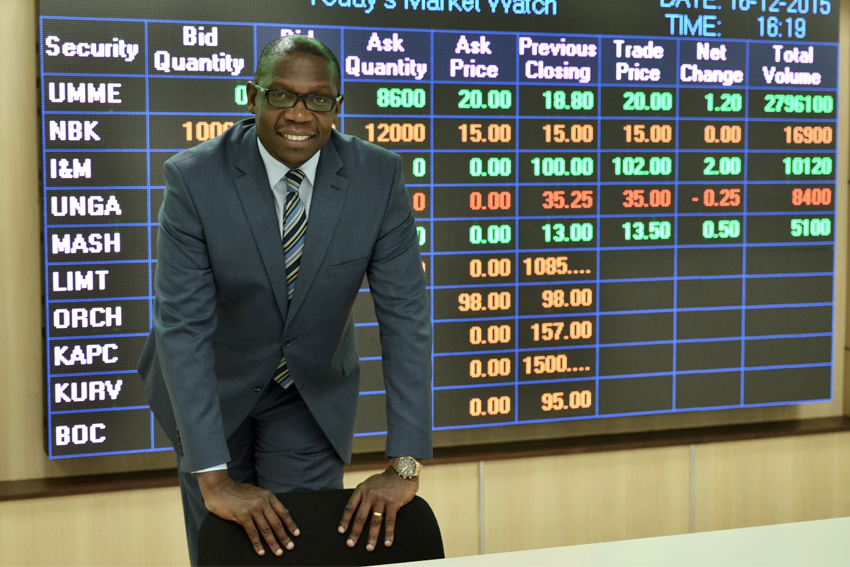As East Africa’s financial services hub, Kenya is a strategic dual listing gateway to not only East African capital markets but also as a strategic ‘jump-off’ point into the rest of the continent. Geoffrey Odundo, CEO of the Nairobi Securities Exchange, explains why the NSE should be any investor’s preferred exchange in Africa.

How does liquidity of the listed securities on the exchange in Kenya compare to in Africa? Could you please discuss the significance of this step to diversify NSE’s product offering and prospect of improving liquidity?
I will re-affirm that, indeed, liquidity IS the lifeblood of any exchange; it is the ease with which shares can be bought and sold and is critical for buoyant secondary trading. For any market to work effectively and have enhanced liquidity, it must have the mechanisms to execute short sales.
In Kenya the Nairobi Securities Exchange (NSE) is working with various stakeholders to develop a comprehensive framework and requisite regulations to enable market makers, short sellers and stock lenders to operate in the domestic capital market. The market makers will provide two-way prices to ensure that investors actually buy or sell the units they seek to at a specified price at any time.
The NSE currently has 64 listed securities with a market capitalization of KES 2 billion ($19.2 million) as at February 3, 2016. The Exchange self-listed in 2014, becoming the second bourse to self-list in Africa.
The Exchange plans to launch the Derivatives Market and Exchange Traded Funds (ETFs) in Q1 of 2016 and a mobile-based retail bond dubbed the “M-Akiba Bond”. This latter instrument is a unique innovation that will facilitate the rapid mobilization of domestic savings and place Kenya on the fast track to achieving the sustainable development goals.
As an active member of the Sustainable Stock Exchanges Initiative, the Exchange is also working closely with multilateral partners and some of our issuers to launch alternative green products, such as green bonds and a carbon trading segment.
We expect listings to occur on our traditional equity and bond segments. In light of the above, we have commenced the upgrade of our automated trading system (ATS) and expect to complete the same in the second half of 2016. This will enhance our capability to support the trading of the aforementioned products.
How does the introduction of REITs (real estate investment trusts) reflect on NSE’s competitiveness in Africa?
Kenya has the largest co-operative movement (what you call community saving groups) in Africa. As of today, the total savings of the cooperative movement is more than 30% of our gross national savings, which is immense. This particular sector is heavily invested in property; some of the largest buildings you see in Nairobi are owned by the co-operative movement.
Traditionally, co-operative savings have largely been invested in real estate. Most of the societies have been facing liquidity challenges, as property by its very nature is a sticky asset class. We’re now providing them with an efficient exit channel by which they can convert sticky holdings into liquid, tradable real estate units.
Beyond this sector, it is important to note that Kenyans are very sentimental about property. The first thing any citizen would do after saving some cash is to invest in property.
REITs further enhance financial inclusion in our capital markets, as average investors will now be able to invest in large-scale commercial, residential or industrial properties, without requiring large sums of money. This investment vehicle creates a convergence of issuers and investors while providing the majority of Kenyans with a unique opportunity to own prime property.
We are currently conducting an extensive education and awareness campaign and have high expectations that this will prove to be a successful segment.
How can dual listings play a role in increasing foreign investment and domestic re-investment into the Kenyan and other African economies?
The NSE currently has one dual listing with the London Stock Exchange: Atlas Development and Support Services, which was listed on the Growth Enterprise Market Segment on December 17, 2014.
Dual listing provides a corporation with exposure to an enhanced governance environment, enhancing credibility of the listed company while also giving it access to the dominant market’s service offering, such as investor showcases, which in turn increases foreign investment.
As East Africa’s financial services hub, Kenya is a strategic dual listing gateway to not only East African capital markets but also as a strategic ‘jump-off’ point into the rest of the continent.
To summarize, how bullish are you to show that the NSE is the choice for an investor, not in East Africa but the whole Africa?
On a bullish scale of 1-10, I will confidently state 11! The NSE offers a unique combination of factors not witnessed anywhere on the continent; it has breadth and depth in products, operates in a well regulated and politically stable environment, has no capital controls or ownership caps, and offers an inexpensive, transparent channel to participate in the African renaissance. Come to the NSE and discover opportunity!
0 COMMENTS